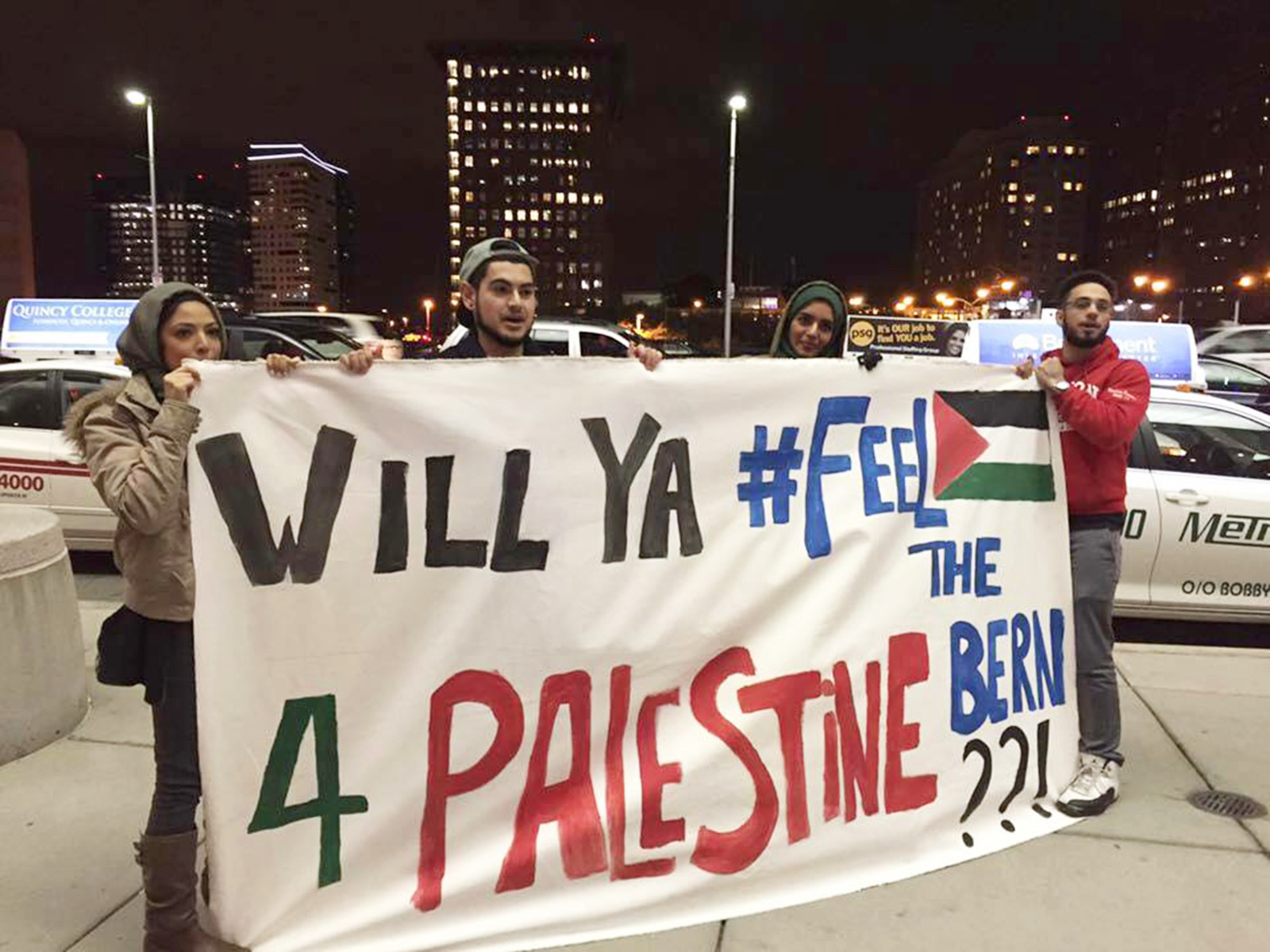
Three Boston University students and members of Boston Students for Justice In Palestine were asked to leave presidential candidate Bernie Sanders’ Boston rally Saturday after holding a banner urging Sanders to speak about human rights in Palestine.
The students were standing on the Lawn on D near the Boston Convention & Exhibition Center, where the rally was held, holding a 30-foot banner stating, “WILL YA #FEELTHEBERN FOR PALESTINE??!” Then, at the order of Sanders’ campaign, an employee of the Lawn requested they take down the banner, and a Massachusetts State Police officer threatened to arrest the students if they did not leave the venue. The interaction is shown in a video uploaded online.
In a phone conversation Monday, Sanders’ national campaign manager Jeff Weaver apologized to two of the students, Jose Godoy and Ibraheem Sumaira, Godoy, a junior in the Questrom School of Business, said.
In an email statement, Weaver said the students were removed “without authorization” and the staff member who ordered their removal is now banned from working future events.
“The sign in question was appropriate and in the spirit of many of the other signs there. I have expressed my regrets about this happening,” Weaver wrote in the statement. “Other event staff are being informed about this and instructed to ensure this doesn’t happen again.”
Michael Briggs, Sanders’ communications director, confirmed Weaver’s personal apology.
“[The banner’s removal] was a mistake by an overzealous campaign worker who has been taken off of that responsibility,” he told The Daily Free Press. “It won’t happen again.”
The video of the incident, initially uploaded by Godoy, sparked significant social media response. At press time it had been viewed more than 18,000 times. Garnering 629 likes on Facebook and establishing its own Twitter handle, “Will Ya #feelthebern 4 Palestine” released a statement on Facebook Tuesday.
“The mere mention of ‘Palestine’ often stirs controversy,” the group wrote in a statement. “We are eager to engage in a dialogue about inclusivity and the elevation of under-represented voices.”
Sumaira, a third-year graduate student in the Henry M. Goldman School of Dental Medicine, said even though the incident was disappointing, it fortunately opened up the chance for a national conversation.
“Our ultimate goal is to advance human rights, specifically Palestinian human rights because Palestinian human rights happens to be the most contentious type of human rights for American politicians,” he said. “We want to see an American politician stand up for Palestinian human rights and show that they truly stand for all human rights, not [just] based on what’s most popular.”
Godoy said he is glad the issue did not go unnoticed by the campaign, and hopes to engage in larger conversations properly and passionately in the future.
“This is going to be an ongoing issue. This is the beginning of the story and we are going to continue with different places. We are continuing our campaign on social media and we are excited to begin the dialogue,” he said. “We have a bunch of groups that are going to jump in. When you have contact with a manager from a political campaign, people are going to want to join the conversation.”
Douglas Kriner, a political science professor in the College of Arts and Sciences, said the issues in Palestine and Israel may not be highly debated leading up to the 2016 presidential election, as the conflict might be overpowered by other more demanding matters.
“The ongoing struggle against [the Islamic State group], Russian involvement in Syria and the Iran nuclear deal and allegations that it undermines Israel’s security will likely squeeze the Israeli-Palestinian crisis off the agenda,” he said in an email.
Several BU students said they support what the students are doing, seeing the importance of igniting conversations on human rights issues.
Spiro Haliotis, a freshman in CAS, said campaigns should not put too much strain on organizations that show up at rallies.
“I think everyone is entitled to their own opinions,” he said. “If people want to hold up a sign, let them hold up a sign. We have our amendments, we have our rights, that’s it.”
Alexandra Kyriakides, a freshman in Questrom, said that no other politicians have addressed this issue and questioned whether campaigns should recognize groups and organizations at rallies.
“These issues don’t necessarily need to be addressed during these campaigns, these are international issues,” she said. “[Sanders] is trying to get as many votes as he can, and addressing a topic like this can sway the votes in the wrong direction.”
Kayla Canne, a senior in the College of Communication, said firing the responsible staffer “says a lot” about Sanders’ campaign and how he responds to diverse issues.
“The issue of human rights is at the forefront of these campaign issues because of everything that has happened in Syria and around the rest of the world,” she said. “It is important for these leaders to speak on these issues, and if this student group was trying to get them to speak about these issues, I don’t see them faulted in any way.”




















































































































